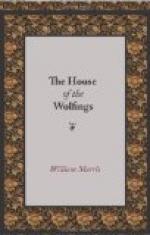And she kissed him in very deed, and made much of him, and fawned on him, and laid her hand on his breast, and he was soft and blithe with her, but at last he laughed and said:
“God’s Daughter, long
hast thou lived, and many a matter seen,
And men full often grieving for
the deed that might have been;
But here my heart thou wheedlest
as a maid of tender years
When first in the arms of her darling
the horn of war she hears.
Thou knowest the axe to be heavy,
and the sword, how keen it is;
But that Doom of which thou hast
spoken, wilt thou not tell of this,
God’s Daughter, how it sheareth,
and how it breaketh through
Each wall that the warrior buildeth,
yea all deeds that he may do?
What might in the hammer’s
leavings, in the fire’s thrall shall abide
To turn that Folks’ o’erwhelmer
from the fated warrior’s side?”
Then she laughed in her turn, and loudly; but so sweetly that the sound of her voice mingled with the first song of a newly awakened wood-thrush sitting on a rowan twig on the edge of the Wood-lawn. But she said:
“Yea, I that am God’s Daughter may tell thee never a whit From what land cometh the hauberk nor what smith smithied it, That thou shalt wear in the handplay from the first stroke to the last; But this thereof I tell thee, that it holdeth firm and fast The life of the body it lappeth, if the gift of the Godfolk it be. Lo this is the yoke-mate of doom, and the gift of me unto thee.”
Then she leaned down from the stone whereon they sat, and her hand was in the dewy grass for a little, and then it lifted up a dark grey rippling coat of rings; and she straightened herself in the seat again, and laid that hauberk on the knees of Thiodolf, and he put his hand to it, and turned it about, while he pondered long: then at last he said:
“What evil thing abideth with
this warder of the strife,
This burg and treasure chamber for
the hoarding of my life?
For this is the work of the dwarfs,
and no kindly kin of the earth;
And all we fear the dwarf-kin and
their anger and sorrow and mirth.”
She cast her arms about him and fondled him, and her voice grew sweeter than the voice of any mortal thing as she answered:
“No ill for thee, beloved,
or for me in the hauberk lies;
No sundering grief is in it, no
lonely miseries.
But we shall abide together, and
that new life I gave,
For a long while yet henceforward
we twain its joy shall have.
Yea, if thou dost my bidding to
wear my gift in the fight
No hunter of the wild-wood at the
changing of the night
Shall see my shape on thy grave-mound
or my tears in the morning find
With the dew of the morning mingled;
nor with the evening wind
Shall my body pass the shepherd
as he wandereth in the mead
And fill him with forebodings on
the eve of the Wolfings’ need.




